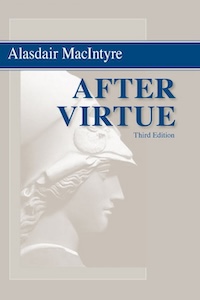After Virtue, Chapter 4
30 Oct 2025

After Virtue: A Study in Moral Theory, Third Edition
Alasdair MacIntyre
University of Notre Dame Press, 1981, 2007
Chapter 4 - historical origins - going backwards from Kierkegaard to Kant to Hume
Fragmentation of morality and creation of emotivist self is a philosophical development originating in the Enlightenment
The Enlightenment is not merely an episode in French history but European history
1630-1850: project of rationally justifying “morals” apart from theology, legal, etc. foundations
Moral commitment as criterionless choice originates in Kierkegaard’s Enten-Eller, in which he presents the choice whether to live morally (good or evil) or aesthetically (amorally). No rational grounds for taking life seriously.
Contradiction: morality that we can choose to regard as authoritative or not, chosen for no reason other than whim or caprice, cannot actually be authoritative (it would maintain authority independently of one’s choice). Clearly, Kierkegaard’s morality is not of this arbitrary kind. For Kierkegaard, there are not rival moralities as there are for us. The question for him isn’t which morality to choose, as it is for us. So what Kierkegaard is engaged in is trying to provide a new foundation for an older way of life.
Kierkegaard’s inherits from Kant, who tried to ground morality in reason, rather than radical choice. Kant’s rules are inherited - he doesn’t question them, but seeks to ground them in reason. Reason here is divorced from conceptions of happiness (since that would make the moral law contingent on the happiness produced) and religion (since the authority of divine command is redundant to the authority of reason itself). The test for reasonableness is whether it’s universalizable - AM includes examples to falsify this idea, and notes that the flaws in Kant’s arguments — which could only be helped by considerations of overall human happiness — mean that his project of justifying morality on pure reason is a total failure, which was what Kierkegaard was responding to.
Kant himself was responding to Hume and Diderot, who presented a primitive emotivism — morality guided by the passions — but both exhibit some very conservative moral tendencies, and admit there must be some means of choosing between competing, mutually exclusive passions. Furthermore, Hume assumes initially that morality must be based in either reason or passion, a false choice which sets off the chain reaction of Hume’s own failure, and subsequently Kant’s failure, and finally Kierkegaard’s failure.